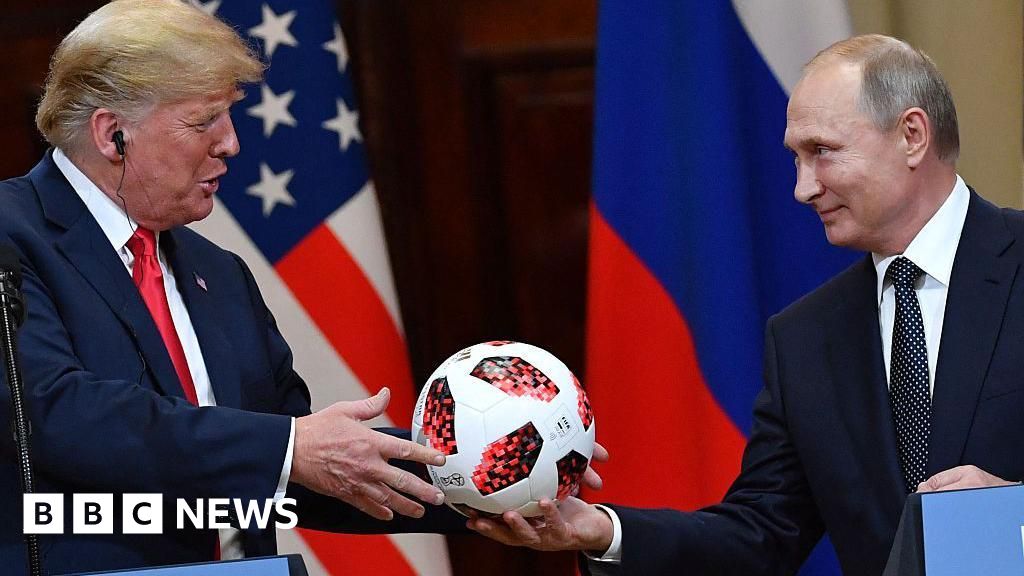How Trump and Putins past meetings went - and what to expect this time
- BBC News
US President Donald Trumps summit with Russian counterpart Vladimir Putin on Friday is a blockbuster moment in world politics that calls to mind several memorable previous meetings.
These events have tended to deliver major news headlines, as well as some glimpses into the intriguing, unpredictable and much-scrutinised personal relationship between the two leaders.
Looking back at the images also gives clues as to how they might approach Fridays head-to-head in Alaska, during which they will discuss ending the war in Ukraine.
The two bring very different approaches to private meetings, according to former officials who have dealt with either or both leaders behind closed doors.
Their first meeting came in July 2017, at a G20 summit in Germany. It was just months after Trump entered the White House, while Putin already had decades of political experience under his belt.
In front of the worlds cameras, the two exchanged warm words, and a businesslike handshake, which set the tone for a generally respectful relationship. In the years to come, the duo went on to express their mutual admiration - although Trump recently told the BBC he was "disappointed" with Putin over the bloodshed in Ukraine.
In fact, Ukraine was raised in that very first meeting, when Trump highlighted Russias efforts to destabilise its neighbour. Three years before, Moscow had illegally annexed the Crimean peninsula.
Fast-forward to 2025 - with Putins full-scale invasion of Ukraine into its fourth year - and Trump is eager to play the role of peacemaker by negotiating a ceasefire.
Trump said on Wednesday there would be "very severe consequences" if the Russian leader did not agree to end the war. At other times, he has taken a softer tone, and has said he simply envisages the meeting to be a "feel-out" exercise.
Trump and Putin again came face-to-face once more in 2017, at an economic forum in Vietnam. They were pictured chatting among other world leaders, and one snap appeared to show Putin talking directly into his opposite numbers ear.
Trump will be familiar with Putins ability to dominate conversations with lengthy, quickly spoken monologues that give his conversant few opportunities to respond, according to diplomats who described the Russian leaders style to the BBC.
"Everything in all meetings with Putin is about power," observed Sir Laurie Bristow, the UK ambassador to Russia from 2016 to 2020. "Who is in control of the timing, the substance, the agenda, the tone - the point is that you never quite know what youre going to get."
As a result, Sir Laurie said, "the interpreters can find it hard to keep up", and it was vital from Trumps perspective that he brought one of his own. Trumps envoy Steve Witkoff allegedly relied on Kremlin translators during a meeting of his own earlier this year.
Former Trump aide Fiona Hill agreed with Sir Laurie, recalling in an interview with the Telegraph her own experiences of dealing with Putin: "He does make fun of Trump. He uses the Russian language in a way that can be quite sarcastic and ironic. Its totally lost in translation."
Perhaps the most overt public display of friendliness between Trump and Putin came when they met for closed-door talks in Helsinki, Finland, in July 2018.
Trump defended Russia over accusations of interference in the 2016 US presidential election, and sided with Putin over the assessments of his own intelligence agencies. The move earned him cross-party condemnation back home in the US.
The Helsinki meeting also produced a memorably informal image of Putin gifting Trump a football from the recent mens World Cup, which had been hosted by Russia.
Such gestures on Putins part were always carefully calculated, according to Sir Tony Brenton, another former British ambassador to Russia. Sir Tony recalled Putin showing "Russian old-world courtesy" during meetings in which he was present in the mid-2000s, although "there was always a degree of reserve underneath it, and he was never a very spontaneous character".
He added: "The footballs and the smiles, the jokes and that sort of stuff… hes not naturally a hail fellow well met guy, but he does work at it when he thinks its important for the relationship."
The pair met for further G20 summits in Argentina, in November 2018, and in Japan in June 2019.
John Bolton, Trumps former national security adviser with whom he later fell out, was present on the latter occasion. He told the BBC he was struck by the mens differing attitudes to detail, which he put down to Putins training in the Soviet intelligence service.
Of Putin, he said: "Ive never seen him any way other than being prepared, very calm, very reasonable in his presentation, and I think thats part of his KGB training."
By contrast, Bolton said, Trumps approach to private meetings was similar to his press conferences in public, in that he was prone to freewheeling statements that could surprise even his own aides. "He doesnt really prepare for them because he doesnt really think he needs to; he doesnt think he needs the background information. Im sure theyre preparing briefing materials as we always did, and he wont read them."
Trump believed that a healthy personal relationship with another leader would mean a healthy state-to-state relationship, Bolton said - and Putin knew this. "He will use his KGB training to try and manipulate Trump. Hes done it before and hell do it again."
Trump himself has downplayed expectations ahead of Fridays meeting in Alaska, remarking: "I think itll be good. But it might be bad."